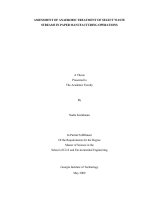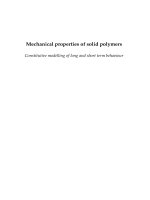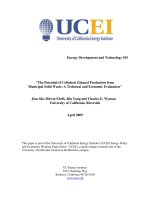Definition of solid waste training
Bạn đang xem bản rút gọn của tài liệu. Xem và tải ngay bản đầy đủ của tài liệu tại đây (1.17 MB, 81 trang )
Waste
Determination
Michael Gage
New Jersey Department of Environmental Protection
County Environmental and Waste Enforcement
Special Investigations and Oversight Unit
Definition of a “Solid Waste”
“Solid Waste” Definition:
As per 261.2(a)(1)
A Solid Waste is any discarded material that is
not excluded by 261.4(a) or that is not
excluded under 260.30 and 260.31.
Is The Material Discarded?
As per 261.2(a)2
A discarded material is any material which is:
•
Abandoned
•
Recycled
•
Inherently Waste-Like
As per 261.2(b)
Materials are solid waste if they are abandoned by
being:
•
Disposed of
•
Burned or Incinerated
•
Accumulated, stored, or treated (but not
recycled) before or in lieu of being abandoned
by being disposed of, burned, or incinerated
Is The Material Discarded
by Being Recycled?
As per 261.2(c)
Materials are solid waste if they are recycled - or
accumulated, stored, or treated before recycling
- by being:
•
Used in a manner constituting disposal
•
Burned for energy recovery
•
Reclaimed
•
Accumulated Speculatively
Is The Material Discarded
by Being Recycled?
As per 261.2(c)
Materials are solid waste if they are recycled - or
accumulated, stored, or treated before recycling -
by being:
•
Used in a manner constituting disposal
•
Applied to or placed on the land in a manner that constitutes disposal; or
•
Used to produce products that are applied to or placed on the land or are otherwise
contained in products that are applied to or or placed on land (in which cases the
product itself remains a solid waste).
Commercial chemical products listed in 261.33 (“P” and “U” listed waste) are not solid
wastes if they are applied to the land and that is their ordinary manner of use. For
example, Endrin is a pesticide which is a listed (P051) and characteristic (D012)
hazardous waste. Therefore off-specification Endrin could be land applied as a
product and therefore not be regulated as a solid waste.
Is The Material Discarded
by Being Recycled?
As per 261.2(c)
Materials are solid waste if they are recycled - or
accumulated, stored, or treated before recycling
- by being:
•
Burned for energy recovery
•
Burned to recover energy
•
Used to produce a fuel or otherwise contained in fuels
Commercial chemical products listed in 261.33 (“P” and “U” listed waste) are not
solid wastes if they are themselves fuels. Recent guidance from EPA has expanded
this exemption to include characteristic wastes which are themselves fuels. This
exemption is what allows gasoline tank clean-outs to be handled as a ‘product’ when
used to make industrial boiler fuel.
Is The Material Discarded
by Being Recycled?
As per 261.2(c)
Materials are solid waste if they are recycled -
or accumulated, stored, or treated before
recycling - by being:
•
Reclaimed
•
As per 261.1(c)4 A material is “reclaimed” if it is processed to recover a usable
product, or if it is regenerated. Examples are recovery of lead values from spent
batteries and regeneration of spent solvents.
Is The Material Discarded
by Being Recycled?
As per 261.2(c)
Materials are solid waste if they are recycled -
or accumulated, stored, or treated before
recycling - by being:
•
Accumulated Speculatively
•
As per 261.1(c)8 A material is “accumulated speculatively” if it is accumulated
before being recycled. A material is not accumulated speculatively, however, if
the person accumulating it can show that the material is potentially recyclable
and has a feasible means of being recycled; and that - during the calendar year
(commencing on January 1) - the amount of material that is recycled, or
transferred to a different site for recycling, equals at least 75 percent by weight
or volume of the amount of that material accumulated at the beginning of the
period.
Is The Material Discarded
by Being Recycled?
As per 261.2(c)
Materials are solid waste if they are inherently waste-like.
•
Hazardous Waste Numbers F020, F021, F022, F023,
F026 and F028
•
Secondary materials fed to a halogen acid furnace
that are characteristic or listed hazardous wastes.
•
Materials meeting criteria established by EPA.
Is The Material Discarded
by Being Recycled?
As per 261.2(e)(1)
Materials are not solid waste if they are
recycled by being:
•
Used or reused as ingredients in an
industrial process to make a product,
provided that the materials are not being
reclaimed.
Is The Material Exempt by
Being Recycled?
As per 261.2(e)(1)
Materials are not solid waste if they are recycled
by being:
•
Returned to the original process from which
they are generated, without first being
reclaimed or land disposed. In cases where
the original process to which the material is
returned is a secondary process, the materials
must be managed such that there is no
placement on the land.
Is The Material Exempt by
Being Recycled?
As per 261.2(e)(2)
Materials remain solid waste when recycled by
being used, reused, or returned to original
process if this recycling includes:
•
Used in a manner constituting disposal, or
used to produce products that are applied to
the land
•
Burned for energy recovery, used to produce
a fuel, or contained in fuels
Is The Material Not Exempt by
Being Recycled?
As per 261.2(e)(2)
Materials remain solid waste when recycled by
being used, reused, or returned to original
process if this recycling includes:
•
Accumulated Speculatively
•
Inherently waste-like
•
Hazardous Waste Numbers F020, F021, F022, F023, F026 and F028
•
Secondary materials fed to a halogen acid furnace that are characteristic or listed
hazardous wastes.
•
Materials meeting criteria established by EPA.
Is The Material Not Exempt by
Being Recycled?
Table 1
* indicates material is a solid waste
… indicates material is not a solid waste
Definitions 261.1 & 260.10
Spent Material - Any material that has been used and as a result
of contamination can no longer serve the purpose for which it
was produced without processing.
Sludge - Any solid, semi-solid, or liquid waste generated from a
municipal, commercial, or industrial wastewater treatment plant,
water supply treatment plant, or air pollution control facility
exclusive of the treated effluent from a wastewater treatment
plant.
Byproduct - A material that is not one of the primary products of a production
process and is not solely or separately produced by the production process.
Examples are process residues such as slags or distillation column bottoms.
The term does not include a coproduct that is produced foe the general
public’s use and is ordinarily used in the form it is produced by the process.
Definitions 261.1
Commercial Chemical Products - As per 261.33(d) - comment A
chemical substance which is manufactured or formulated for
commercial or manufacturing use which consists of the
commercially pure grade of the chemical, any technical grades
of the chemical that are produced or marketed, and all
formulations in which the chemical is the sole active ingredient.
Scrap Metal - Bits and pieces of metal parts (e.g.,) bars,
turnings, rods, sheets, wire) or metal pieces which may be
combined together with bolts or soldering (e.g., radiators, scrap
automobiles, railroad box cars), which when worn or
superfluous can be recycled.
“Solid Waste” Definition:
As per 261.2(a)(1)
A Solid Waste is any discarded material that is
not excluded by 261.4(a) or that is not
excluded under 260.30 and 260.31.
The Material Is Discarded - Is
it excluded by 261.4(a)?
As per 261.4 The following materials are not
solid wastes:
•
Domestic Sewage (untreated sanitary
wastes), and any mixture of domestic
sewage and other wastes, that passes
through a sewer system to a POTW for
treatment. These wastes are regulated
under the Clean Water Act.
The Material Is Discarded - Is
it excluded by 261.4(a)?
•
Industrial Wastewater Discharge that are
point source discharges subject to
regulation under Section 402 of the Clean
Water Act. This only applies to the actual
point discharge, not to wastewater while
being collected, stored, or treated, or to
sludges generated by industrial wastewater
treatment.
As per 261.4 The following materials are not
solid wastes:
The Material Is Discarded - Is
it excluded by 261.4(a)?
•
Irrigation return flows
•
Source, special nuclear or byproduct
materials as defined by the Atomic Energy
Act
•
Materials subject to in-situ mining
techniques and which remain in the
ground
As per 261.4 The following materials are not
solid wastes:
The Material Is Discarded - Is
it excluded by 261.4(a)?
•
Pulping liquors reclaimed in a pulping
liquor recovery furnace and then reused
in the pulping process, unless
accumulated speculatively
•
Spent sulfuric acids used to produce
virgin sulfuric acid, unless accumulated
speculatively
As per 261.4 The following materials are not
solid wastes:
The Material Is Discarded - Is
it excluded by 261.4(a)?
•
Secondary materials reclaimed and returned for reuse to
original process in which they were generated, provided:
•
Only tank storage involved
•
Closed Process
•
Reclamation does not involve controlled flame combustion
•
Less than 12 months accumulation prior to reclamation
•
Reclaimed material is not used to produce a fuel
•
Reclaimed material is not used in a manner constituting
disposal
As per 261.4 The following materials are not
solid wastes:
The Material Is Discarded - Is
it excluded by 261.4(a)?
•
Spent wood preserving solutions and waste
waters that have been reclaimed and are reused
to treat wood, if all of the following conditions are
met:
•
The wood preserving wastewaters and spent wood
preserving solutions are reused on-site at water borne
plants in the production process for their original intended
purpose
•
Prior to reuse, the wastewaters and spent wood preserving
solutions are managed to prevent release to either land or
groundwater or both
As per 261.4 The following materials are not
solid wastes:









